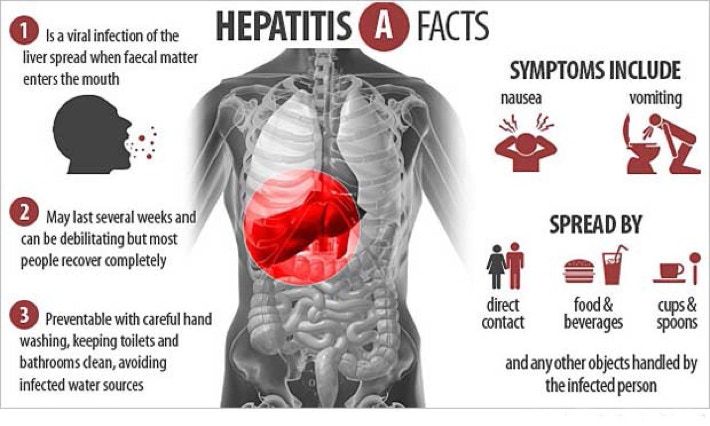

Doctors
Institutions
Conditions
Drugs
Insurances
TCM
Research
About Us
Contact Us
What is hepatitis A?
Hepatitis A is a liver disease that is easily spread from person to person (highly contagious). It is caused by the hepatitis A virus.
Hepatitis is a redness or swelling (inflammation) of the liver that sometimes causes lasting damage. Hepatitis A is one type of hepatitis.
In most cases, hepatitis A does not cause a long-term or chronic infection. But it can take some time to fully get well. You may be sick for a few weeks, but it may take up to 6 months to fully recover.
In some cases hepatitis A can cause severe liver damage.
What causes hepatitis A?
Hepatitis A is usually spread when the virus is taken in by mouth. This happens when you have contact with objects, food, or drinks that are contaminated by the stool of an infected person.
This may happen through person to person contact such as:
When an infected person doesn’t wash their hands well after going to the bathroom and touches other objects or food
When a parent or caregiver doesn’t wash their hands well after changing diapers or cleaning up the stool of someone who is infected
When you have sex with someone who is infected
This can also happen if you:
Eat food made by someone who touched infected stool
Drink water that is contaminated by infected stool (a problem in developing countries)
In rare cases, the virus may also be spread by contamination from blood and other body fluids (blood-borne infection).
In most cases, normal contact in school or at work won’t spread the virus.
Who is at risk for hepatitis A?
You may be at high risk for hepatitis A if you travel to places where the virus is common. These places include:
Africa
Asia (except Japan)
The Mediterranean basin
Eastern Europe
The Middle East
Central and South America
Mexico
Parts of the Caribbean
You may also be at high risk if you:
Are living in or moving to a place in the US or another country that has had 1 or more recorded large numbers of hepatitis A cases, or outbreaks, in the past 5years
Are in the military
Have unsafe sex
Use illegal IV (intravenous) drugs
Have a blood disorder such as hemophilia, and need to take blood treatments
Work at a daycare center
Work in a nursing home, prison, or other type of care facility
Are a lab worker who handles live hepatitis A virus
Handle monkeys or apes (primates) that may have the hepatitis A virus
Hepatitis A is sometimes called a traveler's disease. It is a very common disease for travelers. But you can also get infected with hepatitis A in the U.S. In some cases people in the U.S. have gotten the virus without having any risk factors.
What are the symptoms of hepatitis A?
Symptoms of hepatitis A often look like flu symptoms. Each person’s symptoms may vary. Symptoms may include:
Fever
Chills
Joint pain
Extreme tiredness (fatigue)
Overall feeling of weakness
Loss of appetite
Upset stomach or nausea
Vomiting
Belly or abdominal pain
Dark urine
Clay-colored stools
Yellowish skin and eyes (jaundice)
Diarrhea
Some adults have no symptoms. Most children have no symptoms, especially children under 6 years old.
Hepatitis A symptoms can look like other health problems. Always see your healthcare provider to be sure.
How is hepatitis A diagnosed?
Your healthcare provider will give you a physical exam and ask about your past health.
A blood test called IgM anti-HAV is needed to be sure you have hepatitis A. This test looks for any infection-fighting cells (antibodies) you may have against the hepatitis A virus in your blood. If these antibodies are in your blood, that means you have had an infection.
How is hepatitis A treated?
Your healthcare provider will create a care plan for you based on:
Your age, overall health, and past health
How serious your case is
How well you handle certain medicines, treatments, or therapies
If your condition is expected to get worse
What you would like to do
Most people with hepatitis A get better without any medical care. In some cases bed rest and some medicines may be needed.
What are the complications of hepatitis A?
In rare cases hepatitis A may cause liver failure.
What can I do to prevent hepatitis A?
To help stop the spread of hepatitis A, it is important to have good personal health (hygiene) habits and avoid any risky behaviors. Wash your hands often after using the bathroom, changing a diaper, or before making food.
In addition, there are 2 shots that can help protect you from hepatitis A:
Immune globulin shot (injection). This shot is a mix of infection-fighting cells or antibodies. You can have the shot before you may be exposed to the virus, such as before you travel. You can also have the shot soon after you have been exposed to the virus.
Hepatitis A vaccine. This vaccine is made from whole, killed hepatitis A virus. It does not have a live virus, so you can’t get hepatitis from it. The vaccine helps to get your body's natural infection-fighting system (immune system) working. After you have the shot, your body makes antibodies that protect you against the virus.
The hepatitis A vaccine is recommended for anyone who wants it. The vaccine is very important for people who are at risk for infection such as:
People traveling to or working in countries with medium to high rates of hepatitis A
All children 1 year old
Men who have sex with men
People who use illegal drugs
People whose jobs make them at risk for the disease
People with long-term (chronic) liver disease
People with bleeding disorders (clotting-factor disorders) such as hemophilia
Living with hepatitis A
Symptoms of hepatitis A can last from a few weeks to a few months. Follow your healthcare provider’s advice on how to treat and manage hepatitis A.
When you have hepatitis A it’s very important to:
Have a healthy diet
Get plenty of rest
Take any medicines your healthcare provider has recommended
Not drink alcohol
When should I call my healthcare provider?
Call your healthcare provider if your symptoms don’t go away as soon as expected. Also call if your symptoms go away and then come back.
Key points
Hepatitis A is a liver disease that is easily spread from person to person (highly contagious). It is caused by the hepatitis A virus.
In most cases it doesn’t cause a long-term or chronic infection.
In some cases it can cause severe liver damage.
Hepatitis A is usually spread when you have contact with objects, food, or drinks that are contaminated by the stool of an infected person.
Symptoms of hepatitis A can look like flu symptoms.
Some adults have no symptoms. Most children have no symptoms.
A blood test called IgM anti-HAV is needed to be sure you have hepatitis A.
You may be at high risk if you travel to places where the virus is common.
Other high risk factors include using illegal drugs, having unsafe sex, and working in a daycare center or nursing home.
Most people recover without any medical care.
You can help prevent it by getting an immune globulin shot or the hepatitis A vaccine.
All children 1 year old should have the hepatitis A vaccine.
Next steps
Tips to help you get the most from a visit to your healthcare provider:
Before your visit, write down questions you want answered.
Bring someone with you to help you ask questions and remember what your provider tells you.
At the visit, write down the names of new medicines, treatments, or tests, and any new instructions your provider gives you.
If you have a follow-up appointment, write down the date, time, and purpose for that visit.
Know how you can contact your provider if you have questions.
















